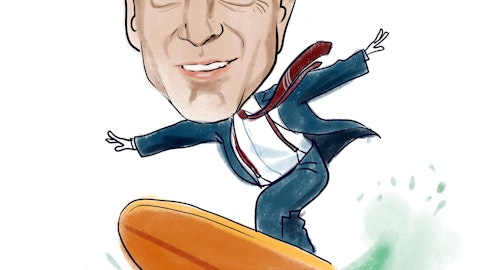The obesity drug war is about to begin.
Investors are anxiously waiting for the launch of Arena Pharmaceuticals, Inc. (NASDAQ:ARNA) and Eisai‘s obesity drug Belviq, which will match up with VIVUS, Inc. (NASDAQ:VVUS)‘ Qsymia, which hit pharmacies a few months ago. We’ll also get safety data for Orexigen (NASDAQ:OREX)‘s Contrave later this year, which could put it on the market a few months after that.
But Belviq, Qsymia, and Contrave aren’t the first obesity drugs on the market. We’ve been to this rodeo before. And it wasn’t pretty.

Lesson number one: no obesity drug has ever been a blockbuster because of a combination of minimal efficacy combined with safety issues.
Wyeth’s Fen-phen, and Abbott Laboratories (NYSE:ABT)‘ Meridia, were pulled from the market because of side effect issues. Roche’s Xenical is still on the market, but has never racked up monster sales because the drug causes some rather unpleasant side effects. It blocks the uptake of fat, and if patients eat too much fat, let’s just say that it isn’t pretty when it passes out the other end. GlaxoSmithKline plc (ADR) (NYSE:GSK) said it plans to sell Alli, the over-the-counter version of Xexical, presumably because it never reached full potential .
There’s a startlingly large number of American’s that are obese, 78 million adults according to the last count by the CDC . If you charged them all $1,000 per year for an obesity drug, that’s a potential $78 billion market. And yet no drug can get to $1 billion. What’s the problem?
Let me be blunt
There’s one thing some people trying to lose extra weight struggle with: laziness. I speak from experience; I’ve lost a whopping five pounds since I joined my gym more than a year ago. That extra helping of desert is so tempting. So is the snooze alarm.
The characterization is a generalization, of course. There are reasons that people have trouble losing weight other than laziness. But when it comes to drug sales, generalizing is OK. It’s the actions of a large majority that will drive drug sales, not the minority that proves the rule.
Those lazy people are now looking for an easy way to lose weight by taking Belviq and Qsymia, but, unfortunately, there’s no easy way to shed substantial pounds. It takes exercise and dieting to lose weight.
But patients lost weight in clinical trials
Yes they did. The drugs help patients lose weight, but it’s extra weight loss. Almost half of the weight loss seen in the Belviq trials, for instance, could be attributed to lifestyle changes. Patients in the placebo arms of the combined phase 3 trials lost 2.5% of their body weight, compared to 5.8% for patients taking Belviq .
People willing to enter a clinical trial for an unproven drug are likely a lot more motivated to lose weight than the general public. Remember all those side effect issues from other drugs?
And only some of the patients in the trial were actually motivated to lose the weight. A whopping 50% of patients in one of the Belviq trials withdrew before completing one year of the trial.




